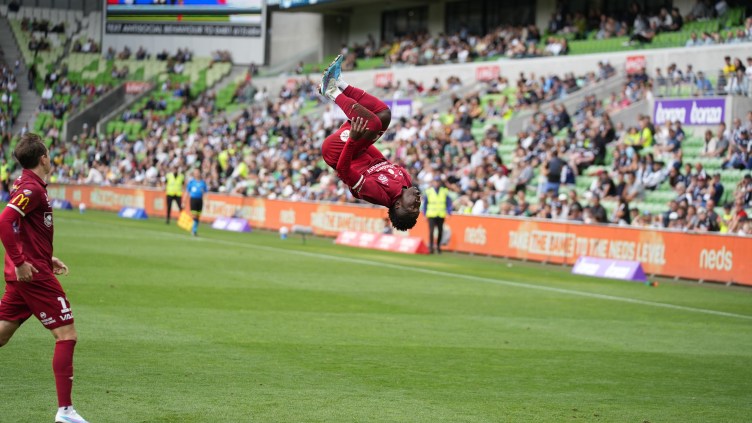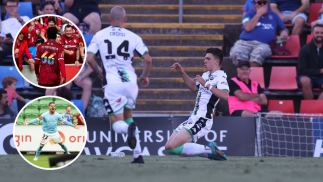It was 3.00am in Perth when Danny Vukovic was woken by the phone ringing.
Bleary-eyed, he checked to see who was calling: it was a private number.
“I just had a feeling: this was the call,” Vukovic recalls. “And it was.”
And so, the mad dash began. Vukovic rushed to call his wife Kristy who, along with their one-year-old son Harley, were together at home in Sydney.
Time was of the essence for the family of three.
“I called my wife, and she got Harley ready and got to the hospital as soon as possible,” Vukovic says.
“At the same time I booked my flight, and flew out on on the first flight from Perth to Sydney.”
The urgency stemmed from the message delivered to Vukovic by the voice on the other end of the phone, in the dead of that Perth night in late 2016.
“A guy on the other end said there was a liver at Westmead (Hospital), and (we should) get Harley there as soon as possible.”
Harley Vukovic was born in July of 2015. By Christmas, he was diagnosed with biliary atresia, a rare liver disease which results in the build-up of bile in the liver due to scarred and blocked bile ducts which are unable to drain.
It resulted in Harley’s skin turning yellow, along with the whites of his eyes. That’s a common occurrence in newborn babies – but Harley’s condition did not improve with the passing of time.
“That’s when we went to investigate more,” Vukovic tells KEEPUP. “(Doctors) said: ‘It’s a very serious condition, one that he’d quite possibly need a liver transplant for to be able to survive’.
“You go through a whole range of emotions. We were devastated initially, and scared because it’s a life-threatening disease. We just had our first child and the excitement around that, then you receive this huge blow. We were scared, we were anxious, we were upset.”
At roughly six weeks of age, Harley underwent an operation called a portoenterostomy – or a Kasai procedure – to attempt to drain his liver by removing the blocked ducts and connecting the liver to the small intestine.
The procedure is ineffective in roughly one quarter of infants who undergo it. Harley was in that unlucky 25%.
“That’s when Harley went on the transplant list,” Vukovic says.
Harley Vukovic is now approaching his eighth birthday. He’s a healthy child in a family of four who Vukovic says “live a normal life” together. He reports that fact with gratitude and pride.
It’s all thanks to a perfect stranger who, at some stage in their life, instigated the one-minute registration process to become an organ donor.
It’s what led to Vukovic’s mad scramble from Perth to Westmead Hospital in the west of Sydney. He didn’t get there in time to see his son before he went into surgery – but he was right there the moment Harley woke in intensive care.
Vukovic was almost floored by a sight he’ll never forget.
“It was the first time I’d ever seen him with the whites of his eyes,” he says.
“Prior to the transplant it was always the yellow in the whites of his eyes. It was an amazing moment, and it was the first time I realised he had a working liver.
“It was just pure excitement and joy, knowing that now he’s got a chance at living a long and prosperous life, and we’d get to watch our little boy grow up… it was one of the most amazing days of my life.”
Visit DonateLife and become an organ donor today!
That amazing day released the pressure valve for Danny and Kristy Vukovic, who had spent the best part of two years “dealing with that day-to-day and the worry” caused by their son’s illness.
Vukovic’s form as a footballer took a hit as a result. The Socceroos goalkeeper was at Melbourne Victory at the time of Harley’s birth, for what he concedes was “his worst season… I think everything i was dealing with off the pitch contributed to that.”
But a move home to New South Wales and Sydney FC the following season coincided with Harley’s successful liver transplant, which was followed just months later by Vukovic clinching the A-League Men championship with the Sky Blues.
With Harley’s health improving, the Vukovic family went on to spend four memorable years in Belgium.
Signed by Belgian Pro League club Genk, Vukovic watched his son go from strength to strength, going on to become becoming somewhat of a celebrity around the club, taking part in – and at times leading – post-match chants between the players and fans.
Vukovic was signed by Central Coast Mariners in 2022, returning home to New South Wales to captain his former club into the 2022-23 A-League Men season.
He has one dream for the remainder this season: to have his sons Harley and Axel on the pitch alongside him as the Mariners lift the championship trophy in May.
Vukovic is grateful he’s even allowed to entertain those sort of ideas today, after what his eldest son endured through the earliest stages of his young life.
“My concerns at the time were, of course, that if he doesn’t have a liver transplant he won’t be with us anymore,” he says. “That unfortunately is something that happens in Australia; there’s a lot of people waiting for organs, and a lot of people unfortunately don’t get one in time. Of course, that was a concern for me and my family.”
According to DonateLife, 1,800 Australians are currently waitlisted for an organ transplant. An additional 14,000 are on dialysis and may need a kidney transplant.
Becoming an organ donor literally does take less than one minute. If you don’t have to dig through your belongings to find your medicare card, you could do it in half that time.
“It’s the most selfless decision you can make,” Vukovic says. “And for our family, someone out there decided to become an organ donor, and that decision means we have our son with us right now, and we get to enjoy him every day.
“Every day is a blessing. It took someone to make that decision whenever they did, it’s given us a chance to live a normal life, and given our boy a chance to live a normal life.”
Harley Vukovic was one of the lucky ones, and since the operation, his his day-to-day life has changed drastically.
“When he was really sick it was a lot of medication, a lot of doctor visits, hospital visits,” Vukovic says. “I think he was on six or seven different medications in the morning, and the same at night.
“And now, it’s one tablet in the morning and one at night. A lot less hospital visits; we’re at the hospital every three or four months for a checkup. We live a normal life now. Of course, there’s things we need to be wary of and look out for, but for the most part it’s just a normal life with our family.”
Vukovic adds: “It’s extremely important to have Australians join the donation list, and become organ donors. The more people that do, the more lives that can potentially be saved.
“Some people might feel like they are organ donors, but unfortunately until you register you’re not considered an organ donor. It’s really easy to become an organ donor, you just have to visit DonateLife, it takes less than a minute to register… the more people on the donation list the more lives that can be saved.
“There’s a lot of people still waiting to have their transplant.”




